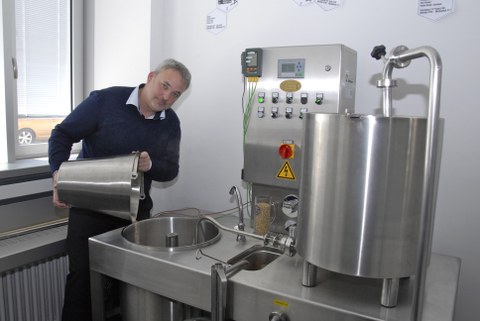Apr 22, 2016
Brewing beer in research and teaching

Prof. Jan J. Weigand at TU Dresden's mini-brewery
From the lecture hall to the mini-brewery: Brewing beer as part of the studies
One could also look it up in a textbook but trying it out yourself in the mini-brewery makes studying more impressive. The mini-brewery of the TU Dresden’s Department of Chemistry and Food Chemistry provides unique opportunities to gain insights into various areas: e.g. basic research (reactions during drying and roasting of malt, new reactions of yeast, formation of flavour compounds during storage), test applications on a small scale of approx. 50 litres (transfer of basic research to application, development of new beer recipes through the variation of the source materials as well as the process parameters) or even the transfer of research results into economic practice.
The Chair of Inorganic Molecular Chemistry (Prof. Jan J. Weigand) and the Chair of Food Chemistry (Prof. Thomas Henle) have established this experimental brewery for the degree courses “Chemistry” and “Food Chemistry”. From the winter semester 2015/2016 onwards it is used as part of the practicum “Technical Chemistry” and also for teaching, research and product development.
Students now have the possibility of getting a taste of brewing beer themselves. Within one day, a complete product is produced based on the corresponding technologies and on natural resources (according the “German Beer Purity Law” exclusively based on water, malt, hop and yeast), which upon the completion of the fermentation process can be consumed. Therefore, brewing beer is a prime example for a scientific and economically highly relevant technical process, which is very well suited for teaching practical questions: How can you assure the production of a constant and reproducible product? Which challenges have to be overcome regarding the source materials, process control and hygiene? Bases on the costs, how do you calculate the potential added value? How does my product taste like?
Overall, there are currently about 600 students at the Department of Chemistry and Food Chemistry. Every semester 70-80 students use the mini-brewery as part of their practicum.
Brewing beer for research: research-based creation of your own beer type
TU Dresden’s Department of Chemistry and Food Chemistry has been conducting research on the topic of “beer” for many years. The working group of Prof. Thomas Henle deals primarily with the chemical reactions during drying, roasting and during the wort boiling. During this processes, chemical reactions occur between sugars and proteins which are called “Maillard reactions”. The reaction products are decisive for the beer’s colour and aroma. The team of Prof. Thomas Henle was able to display through the current research, that different beer types are distinct in the concentration of so-called “dicarbonyl compounds”. These compounds are formed through the heating of glucose, which in turn is set free by the starch of the malt. The storage and aroma properties of the beer are significantly influenced by the sugar degradation products. Creating knowledge about the factors which influence the formation of these dicarbonyl compounds, such as composition of the malt, heat-holding during the wort boiling etc. can contribute to enhancing the product quality.
The “brewing team” of Prof. Jan Weigand and Prof. Thomas Henle has its research focus on the development of own beer creations. Up-to-date research results are immediately implemented in the product development. In the past months a number of “test beers” have been created, that can easily compete with commercial products in the sensory examinations. TU Dresden’s brewers closely cooperate with the Dresden-based “Watzke – brewery”. A Pils, developed by the TUD-brewers is currently being put into practice: On the occasion of the company’s 20th anniversary the “Watzke – brewery” will brew the „TU-Dresden-31Pils“ on a large scale and serve it in September 2016. This is an excellent example of a successful transfer of research results into practice.
The chemists are also proud of the beer’s name: “This is our brand name, which is derived from phosphor – and its symbol “P” and its atom mass 31 – a proper chemists’ beer”, explains Prof. Jan Weigand.
Media inquiries
Prof. Dr. Thomas Henle
Tel.: +49 (0) 351 463-34647
